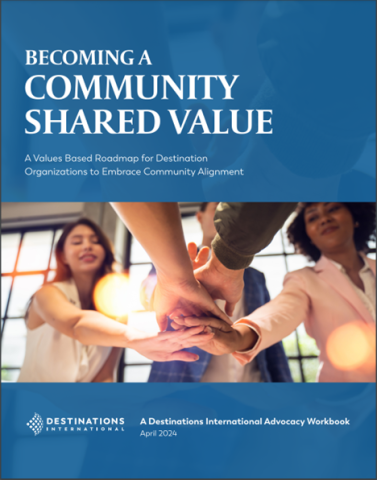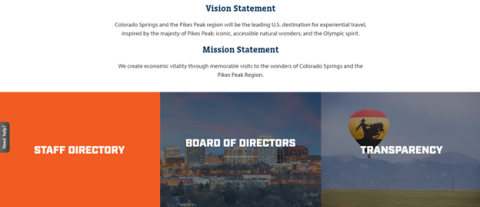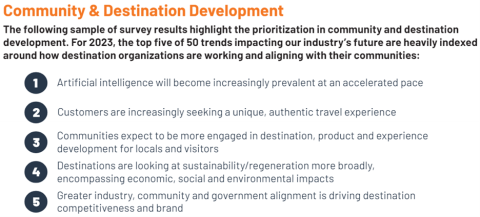
Trust in governments, media, and businesses continues to decline worldwide. Today’s destination organizations must understand the importance of transparency in building and maintaining public trust.
In 2021, Destinations International conducted a transparency audit of the websites of our then-480 destination organization members, assessing their openness and accessibility to stakeholders and the public. The audit, rooted in our commitment to community-focused destination promotion, evaluated the availability of key information such as mission statements, staff and board details, financial reports, and strategic plans.
Key Audit Findings
- Basic Information is Common: Most websites (77%) featured an "About Us" page, and a majority (64%) included staff bios. However, the depth of information varied, with some focusing solely on the destination rather than the organization.
- Financial Transparency Lags: Only a small percentage of organizations publicly shared their financial information, such as financial reports or tax filings, annual reports (28%), and budgets (17%).
- Governance Information Limited: Board-related information was also scarce, with only 48% of websites showcasing board member bios and a mere 4% disclosing board bylaws.
- Usability Issues: Even when information was present, locating information was often challenging due to poor website navigation or outdated content.
The audit highlighted a need for greater transparency among destination organizations, especially regarding finance and governance. These findings serve as a catalyst for meaningful dialogue around the evolving role of destination organizations and the importance of transparency in building public trust.
Transparency in 2024
Nearly three years later, we have increased our membership to over 700 member organizations from 26 countries and territories worldwide. We continue to provide resources and guidance–including conducting a second audit in the coming months—to help our members share information openly and effectively.
This audit is needed more than ever. Across the globe, there has been a notable and continuing trend of a decline in trust in traditional institutions such as governments, media, and businesses. This trend, highlighted by several years of the Edelman Trust Barometer, reflects widespread skepticism and dissatisfaction among the public. Factors contributing to this erosion of trust include perceived corruption, lack of transparency, and failures to address significant societal issues. The implications of this trust deficit are profound. Without trust, the effectiveness of an institution is significantly undermined, leading to decreased civic engagement and resistance to policies and initiatives. This environment fosters uncertainty and instability, as individuals and communities become less willing to support an organization that has lost its trust. To address this, it is crucial for organizations to prioritize transparency, accountability, and proactive engagement with their constituencies to rebuild trust and restore their pivotal role in society.
Specifically, transparency plays a critical role in building and maintaining trust. When organizations, whether businesses, governments or nonprofits, operate transparently, they demonstrate accountability, reliability and openness. Transparency includes sharing information openly, being honest about processes and decisions, and communicating clearly. This approach promotes a sense of security and trust among stakeholders because they feel informed and involved in the organization's actions and decisions.
When trust is built through transparency, it leads to stronger relationships and increased loyalty. Stakeholders are more likely to support and engage with a destination organization they trust because they believe their interests are considered and protected. This trust also enhances a destination organization's reputation, making it more resilient in times of crisis or scrutiny. Conversely, if a destination organization loses trust due to a lack of transparency, the consequences can be severe. The Edelman Trust Barometer consistently shows that once lost, trust is difficult to regain. Stakeholders may feel deceived or betrayed, leading to disengagement, criticism, and reputational damage. Loss of trust can lead to decreased support, both financially and socially. This erosion of trust can also lead to increased scrutiny and regulatory pressure, further complicating recovery efforts.
We recently refreshed one of our most sought-after members-only resources, the Community Shared Value Workbook. Within its pages are loads of exercises destination organizations can use to build the value of transparency in their communities (see Chapter 6).

Recommendations
- Define Your Role: Clearly articulate the organization's mission, values, and impact on the community on your "About Us" page.
- Humanize Your Organization: Go beyond names and titles; share stories, bios, and staff photos to connect the community with the people behind the DMO.
Building Trust Through Transparency
The audit revealed varying levels of transparency across destination organizations. While most websites provided basic information like staff bios and mission statements, many lacked readily accessible details on financials (tax information, annual reports, budgets) and governance (board bylaws, meeting minutes). This gap highlights the need for destination organizations to embrace a more comprehensive approach to transparency, not just sharing successes but also acknowledging shortcomings and challenges.
Recommendations
- Learn from Challenges: Openly share lessons learned from setbacks and demonstrate how the organization adapts and improves.
- Prioritize Easy Access: Ensure critical information is readily accessible through intuitive website navigation and search functionality.
Aligning with Fiduciary Responsibility
Transparency is not merely a best practice but a fundamental duty. Destination organizations utilize public resources, promote community assets, and shape a destination's brand identity—all of which carry significant fiduciary responsibility. By embracing transparency, DMOs honor their duty of care (making informed decisions), duty of loyalty (acting in the destination's best interests), and duty of obedience (fulfilling their mission for the benefit of the entire community).
While the concept of fiduciary responsibility is universal, the specific legal and ethical frameworks may differ across countries. Destination organizations have a responsibility to act in the best interests of their communities, regardless of the specific legal requirements.
Recommendations
- Showcase Accountability: Regularly publish financial reports, audits, and relevant performance metrics. When information lives on partner websites (e.g., government or commerce sites), provide clear links and instructions for easy access.
- Seek Out Peer Examples: The audit identified Visit Colorado Springs as a model of proactive transparency. Its website makes a wide range of information—from financials to strategic plans—readily available. Check out Destination Canada's transparency initiatives, explore how VisitBritain recommends developing a destination management plan and learn how the Vienna Tourist Board showcases transparency.

Empowering Communities through Open Communication
The Destinations International DestinationNEXT 2023 Futures Study revealed that the top five of 50 trends impacting our industry’s future are heavily indexed around how destination organizations work and align with their communities. For example, the trend, “Communities expect to be more engaged in destination, product and experience development for locals and visitors,” rose 27 points to the #3 trend. The eighth-place trend, “There’s a greater focus on placemaking to benefit both locals and visitors,” climbed 20 points in the rankings.

As part of the Study, the CEO of a national European tourism organization stated his organization’s top three priorities are government relations, community building, and tech innovation. He said everything the organization commits to should start with how the visitor economy benefits residents and small businesses.
He explained, “We place a high priority on shared interests with our communities, versus industry interest...Today, we actually see the principles we stand for land in local and regional policy, and the traction with industry entrepreneurs has been great. What we’re really doing is building coalition between the visitor industry and everyone else.”
By embracing transparency, destination organizations not only fulfill their fiduciary duty but also build stronger relationships with their communities. This open communication promotes a sense of shared ownership, where residents feel informed, valued, and empowered to contribute to the destination's success.
Recommendations
- Cater to Residents: Balance content that attracts tourists with resources and information relevant to residents.
- Engage the Community: Offer platforms for dialogue, feedback, and collaboration with residents.
Destinations International is committed to helping members improve their transparency efforts. We will continue to provide resources and guidance to help destination organizations share information openly and effectively. Review Chapter 6 of the DI Community Shared Value Workbook (available for member download only) for in-depth exercises and recommendations to foster transparency in your destination.
As we progress, let us champion transparency as a cornerstone of ethical and effective destination management, ensuring we hear, understand, and empower our communities.


